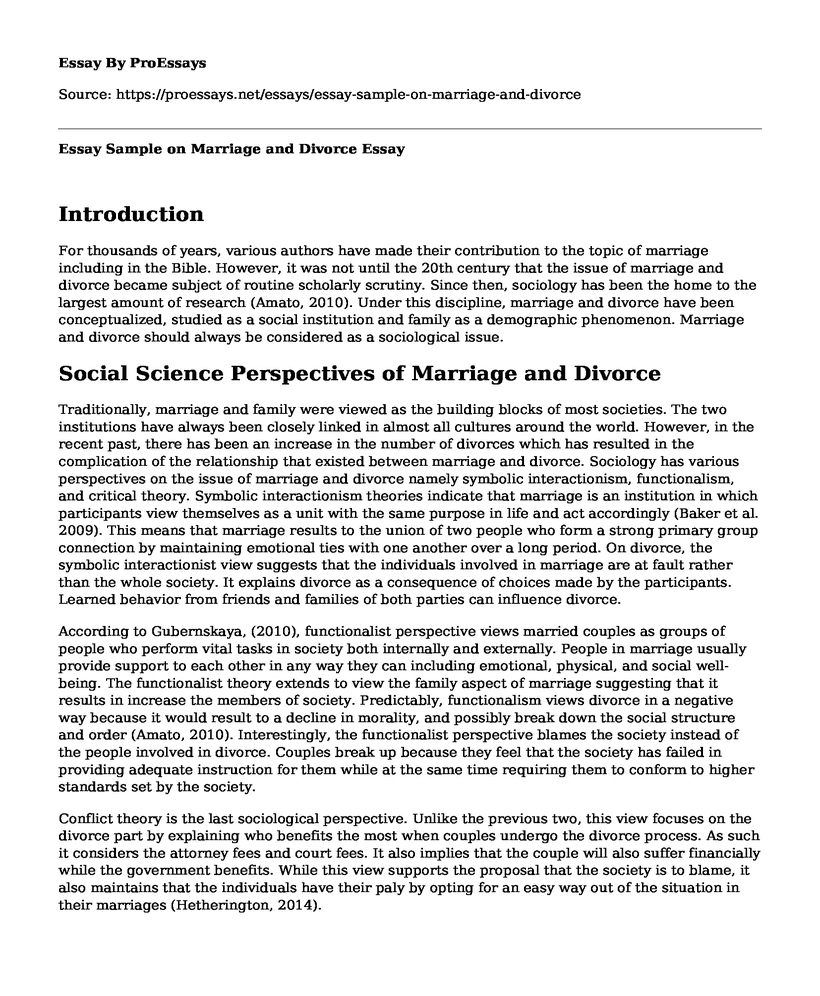Introduction
For thousands of years, various authors have made their contribution to the topic of marriage including in the Bible. However, it was not until the 20th century that the issue of marriage and divorce became subject of routine scholarly scrutiny. Since then, sociology has been the home to the largest amount of research (Amato, 2010). Under this discipline, marriage and divorce have been conceptualized, studied as a social institution and family as a demographic phenomenon. Marriage and divorce should always be considered as a sociological issue.
Social Science Perspectives of Marriage and Divorce
Traditionally, marriage and family were viewed as the building blocks of most societies. The two institutions have always been closely linked in almost all cultures around the world. However, in the recent past, there has been an increase in the number of divorces which has resulted in the complication of the relationship that existed between marriage and divorce. Sociology has various perspectives on the issue of marriage and divorce namely symbolic interactionism, functionalism, and critical theory. Symbolic interactionism theories indicate that marriage is an institution in which participants view themselves as a unit with the same purpose in life and act accordingly (Baker et al. 2009). This means that marriage results to the union of two people who form a strong primary group connection by maintaining emotional ties with one another over a long period. On divorce, the symbolic interactionist view suggests that the individuals involved in marriage are at fault rather than the whole society. It explains divorce as a consequence of choices made by the participants. Learned behavior from friends and families of both parties can influence divorce.
According to Gubernskaya, (2010), functionalist perspective views married couples as groups of people who perform vital tasks in society both internally and externally. People in marriage usually provide support to each other in any way they can including emotional, physical, and social well-being. The functionalist theory extends to view the family aspect of marriage suggesting that it results in increase the members of society. Predictably, functionalism views divorce in a negative way because it would result to a decline in morality, and possibly break down the social structure and order (Amato, 2010). Interestingly, the functionalist perspective blames the society instead of the people involved in divorce. Couples break up because they feel that the society has failed in providing adequate instruction for them while at the same time requiring them to conform to higher standards set by the society.
Conflict theory is the last sociological perspective. Unlike the previous two, this view focuses on the divorce part by explaining who benefits the most when couples undergo the divorce process. As such it considers the attorney fees and court fees. It also implies that the couple will also suffer financially while the government benefits. While this view supports the proposal that the society is to blame, it also maintains that the individuals have their paly by opting for an easy way out of the situation in their marriages (Hetherington, 2014).
Difference between Sociological Perspectives and Psychological Views
Another discipline that has a large amount of research on marriage and divorce is psychology. Under this discipline, marriage is viewed as an emotional response by two people who seek to live together to continue their emotional connections. Psychologists argue that divorce occurs in two stages namely the divorce and legal divorce (Bhrolchain, 2001). Emotional divorce happens when a couple becomes increasingly aware of their feelings of discontent and dissatisfaction towards each other. Therefore, society is not to blame in any way when couples divorce.
Conclusion
Different disciplines have different perspectives on marriage and divorce. Sociology was the first discipline to study this topic. As a result, it has more research on the same than any other. Of the three perspectives of marriage and divorce under sociology, symbolic interactionist and functionalist views offer the most convincing argument about the topic. These two points of view try to explain why people feel the need of getting married as well as reasons why divorces occur.
References
Amato, P. R. (2010). Research on divorce: Continuing trends and new developments. Journal of marriage and family, 72(3), 650-666.
Baker, E. H., Sanchez, L. A., Nock, S. L., & Wright, J. D. (2009). Covenant marriage and the sanctification of gendered marital roles. Journal of Family Issues, 30(2), 147-178.
Bhrolchain, M. N. (2001). 'Divorce effects' and causality in the social sciences. European sociological review, 17(1), 33-57.
Gubernskaya, Z. (2010). Changing attitudes toward marriage and children in six countries. Sociological Perspectives, 53(2), 179-200.
Hetherington, E. M. (2014). Coping with divorce, single parenting, and remarriage: A risk and resiliency perspective. Psychology Press.
Cite this page
Essay Sample on Marriage and Divorce. (2022, Oct 21). Retrieved from https://proessays.net/essays/essay-sample-on-marriage-and-divorce
If you are the original author of this essay and no longer wish to have it published on the ProEssays website, please click below to request its removal:
- Sociology Essay Example - Gender Stereotypes and Culture
- Attachment Styles Essay
- Paper Example on Benefits of Personal Injury Attorneys to the Society
- John McConn: A Model V3 Leader in the Organization & Community - Essay Sample
- The Gender Binary: Presuming Alignment of Sex, Gender & Sexuality - Essay Sample
- New York City: A Vibrant and Busy Metropolis - Essay Sample
- Poor Whites in America: Struggling to Survive - Research Paper Sample







